San
Diego Jewish World
Thursday
Evening , July
12, 2007
Vol. 1, Number
73
|
Archives Event Tracker HOME Jewish Directory Jewish Grapevine Jews in the News News Sleuths Sports |
| PLEASE SUPPORT OUR ADVERTISERS; THEY ARE HELPING TO BRING San Diego Jewish World to you: Anderson Travel Bubbla Packaging Systems I'm There For You Baby radio show In the Know' radio show JCC Maccabi Games Jewish American Chamber of Commerce Seacrest Village Retirement Communities |
Today's Newsmakers..... Click on the caption to go
to their stories
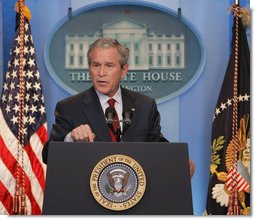
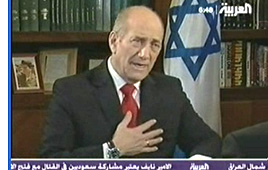




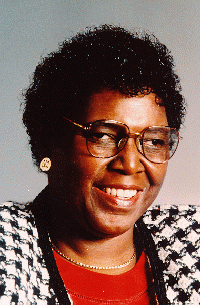
President
Bush
Olmert on Al Arabiya
Lautenberg
Schumer
Feinstein
Johnson
Jordan
|
San Diego Jewish World—July
12, 2007
Dianne
Feinstein eulogizes Lady Bird Johnson, former U.S. First Lady, in Senate
statement
|
presence in Iraq vital for
Israel and rest of Middle
East |
|
Israel—Before taking questions from
the media, the President delivered prepared remarks, among which was this
analysis:
"The fight in
Iraq is part of a broader struggle that's unfolding across the region. The same
region in Iran -- the same regime in Iran that is pursuing nuclear weapons and
threatening to wipe Israel off the map is also providing sophisticated IEDs to
extremists in Iraq who are using them to kill American soldiers.
"The same Hezbollah terrorists who are waging war against the forces of
democracy in Lebanon are training extremists to do the same against coalition
forces in Iraq. The same Syrian regime that provides support and sanctuary for
Islamic jihad and Hamas has refused to close its airport in Damascus to suicide
bombers headed to Iraq. All these extremist groups would be emboldened by a
precipitous American withdrawal, which would confuse and frighten friends and
allies in the region.
Nations throughout the Middle East have a stake in a stable Iraq. To protect our interests and to show our commitment to our friends in the region, we are enhancing our military presence, improving our bilateral security ties, and supporting those fighting the extremists across the Middle East. We're also using the tools of diplomacy to strengthen regional and international support for Iraq's democratic government.
"So I'm sending Secretary Gates and Secretary Rice to the region in early August. They will meet with our allies, reemphasize our commitment to the International Compact of Sharm el Sheikh, reassure our friends that the Middle East remains a vital strategic priority for the United States. "
Senator Levin's call to establish a timetable for withdrawal of most American forces from Iraq came up in the question-and-answer session with the media:
Q Thank you, Mr. President. A question for you about the process you're describing of your decision-making as Commander-in-Chief. Have you entertained the idea that at some point Congress may take some of that sole decision-making power away, through legislation? And can you tell us, are you still committed to vetoing any troop withdrawal deadline?
THE PRESIDENT: You mean in this interim period? Yes. I don't think Congress ought to be running the war. I think they ought to be funding our troops. I'm certainly interested in their opinion, but trying to run a war through resolution is a prescription for failure, as far as I'm concerned, and we can't afford to fail.
I'll work with Congress; I'll listen to Congress. Congress has got all the right to appropriate money. But the idea of telling our military how to conduct operations, for example, or how to deal with troop strength, I don't think it makes sense. I don't think it makes sense today, nor do I think it's a good precedent for the future. And so the role of the Commander-in-Chief is, of course, to consult with Congress.
Q So if Reed-Levin or anything like it were to pass and set a --
THE PRESIDENT: Well, I would hope they wouldn't pass, Jim. But I --
Q But what if they've got --
THE PRESIDENT: Let me make sure you understand what I'm saying. Congress has all the right in the world to fund. That's their main involvement in this war, which is to provide funds for our troops. What you're asking is whether or not Congress ought to be basically determining how troops are positioned, or troop strength. And I don't think that would be good for the country. (Jump to continuation
Arizona (1) Rep. Gabrielle Giffords California (10) Sen. Barbara Boxer Sen. Dianne Feinstein Rep. Howard Berman Rep. Susan Davis Rep. Bob Filner Rep. Jane Harman Rep. Tom Lantos Rep. Adam Schiff Rep. Brad Sherman Rep. Henry Waxman Connecticut (1) Sen. Joseph Lieberman |
Florida (3) Rep. Ron Klein Rep. Debbie Wasserman Schultz Rep. Robert Wexler Illinois (2) Rep. Rahm Emanuel Rep. Jan Schakowsky Kentucky (1) Rep. John Yarmuth Maryland (1) Sen. Joseph Cardin Massachusetts (1) Rep. Barney Frank Michigan (2) Sen. Carl Levin Rep. Sandy Levin Minnesota (1) Sen. Norm Coleman Nevada (1) Rep. Shelley Berkley |
July 12, 2006 IRAQ WITHDRAWAL Date How They voted: HR 2596, to set an April 1, 2008, deadline for troop withdrawal. Yes No Absent
Adopted by
House of Representative type face key:
Democrats |
New Hampshire (1) Rep. Paul Hodes New Jersey (2) Sen. Frank Lautenberg Rep. Steve Rothman
New York (7) |
Oregon (1) Sen. Ron Wyden Pennsylvania (2) Sen. Arlen Specter Rep. Allyson Y. Schwartz Tennessee (1) Rep. Steve Cohen Vermont (1) Sen. Bernie Sanders Virginia (1) Rep. Eric Cantor Wisconsin (3) Sen. Russell Feingold Sen. Herb Kohl Rep. Steve Kagen |
|
Nancy Harrison &
|
Aboard Holland America Ryndam |
|
Israel and Middle East |
Israel's prime minister reflects on his Jewish identity
Editor's Note:
Following is a transcript of a July 10 speech by Israel's Prime Minister Ehud
Olmert to the new Jewish People Policy Planning Institute
By Ehud Olmert
JERUSALEM—First
of all I want to apologize in advance to the press and the networks. I'm going
to be very boring tonight. [Laughter] And I'm not certain that what I have to
say is something that deserves these projectors that are blinding my eyes, but
of course you are free to do whatever you want.
I really thought about this talk tonight, more than I normally do about other
occasions where I'm invited and honored to make a speech or an appearance,
because I think this is different. We are having so many opportunities to talk
about the current issues, the political issues, the political controversies, the
issues of the day, the issues that will become the issues of the headlines
tomorrow. On this particular occasion, I thought that when we talk about
ourselves, it's different. And allow me therefore to share with you things as I
see them from a very different personal perspective.
If I was asked today, which, I am sometimes, how I most accurately define myself
as a person, what is it that will define me more accurately, or most accurately,
probably I would say, certainly I would say, first of all, I am Jewish. Had I
been asked this question when I was much younger, say, at the age of 14 or 15, I
would have said, right away, I'm an Israeli. Something in me changed, to a
degree that my answer is not what it was. And this of course is not accidental;
it's not something that just happened, it happened through a very long and
sometimes painful process of soul searching of who I am and where I come from.
And the older I grew, perhaps with the wider responsibilities which I had to
assume over the years, in different positions, the broader my understanding was
of where it all comes from. And in this process, I didn't become less Israeli,
I became more Jewish.
And the significance of the roots of myself, of my family, I thought for
instance the story of my parents' lives which is one single individual story;
there are millions like it. They were born in Russia and in the Ukraine and
they grew up in China, of all places, and they came to Israel and lived in
Israel all their lives since then. And I thought of what made them move in the
first place from Russia and from the Ukraine to China. And what made them move
was something that belonged to the history of the Jewish people, to the fears of
the Jewish people, to the fate of the Jewish people, to the circumstances which
are so unique for us and which are not identical to the history of any other
people, and this is just one single individual story.
When I thought about the story of my wife's family and so on and so forth, and
the inevitable impact of this was something which is a lot more significant in
the making of a person's perception of himself in the world that he lives in,
than maybe anything else.
(Jump
to continuation)
Transcript of Olmert's candid Al Arabiya interview
Editor's Note: Dubai-based Al Arabiya television posed polite yet tough questions to Israel's Prime Minister Ehud Olmert in an interview shown to the Arab world. Here is a transcript, as provided by Israel's Ministry of Foreign Affairs:
Interviewer: Hello, Mr. Prime Minister. Thank you for your time.
You have often spoken lately of the possibility for an overall regional settlement with Arab countries, the moderate ones as well; but it seems, and this is no secret, that the Arab nations - perhaps even the moderate ones - feel that you are too weak too make historical decisions and are more interested in normalization and no more than that.
PM Olmert: Naturally, I cannot speak for others; I can only speak for myself and for the State of Israel. I wish to remind you that I am the first Israeli leader, and the only one at the level of prime minister, to say to all the Arab countries, following the Riyadh Summit, "We do not reject the Arab League’s peace initiative. Quite the contrary, let's talk about it," and I am willing to talk about it.
So I don’t know the basis for this assumption that I want a de facto arrangement and normalization. I want a peace settlement, first and foremost with the Palestinians; and I am ready to sit down and talk about the Arab initiative with all the rest of the Arab nations with whom we are not at peace. Definitely.
Interviewer: If you’ll allow me, I’d like to take us back a year. We are currently marking one year since the Lebanon war. Would you act the same way as then, meaning would you start an overall campaign against Lebanon and Hizbullah?
PM
Olmert:
First of all, I did not start any campaign. I wish to remind you that the ones
who started the campaign was the Hizbullah organization. The Hizbullah
organization was the one who kidnapped the soldiers, killed Israeli soldiers,
and attacked the northern cities in Israel; and if you would ask this question
of Nasrallah, he would certainly give you an answer, because he said after the
war that if he had known for certain what would happen, he wouldn’t have started
the war. So, first of all, he started the war.
The question I need to answer, and this is a legitimate question, is whether I
would have responded as I did. Today I am convinced, more than ever, that I
would have responded the same way and I am glad that I did. This war caused much
suffering to many people. It caused much suffering to a great many Israelis, to
a great many residents of the State of Israel who live in the north and had to
live for 33 days in bomb shelters; and it caused a great deal of suffering to
the Lebanese, who suffered as a result of this war. These Lebanese need to draw
a conclusion concerning the Hizbullah and the suffering that the Hizbullah
caused them.
There is no doubt that war always entails suffering and that is the last thing
we want. I believe that most people don’t want suffering and don’t want
civilians to be harmed. The
Hizbullah is a terrorist organization.
The Hizbullah is an organization that wants to hurt the State of Israel and to
kill Jews.
We have no problem with Lebanon. According to the UN resolution, we do not occupy any area in Lebanon. Why do they have to attack us; why do they need to kidnap Israeli soldiers? Why do they need to kill Israeli residents? Why do they have to fire Katyushas and rockets on Israeli communities? It’s clear that when they do that, we respond. I want it to be clear that we will never be reconciled to the possibility of someone shooting at us without responding. There can be no such thing.

California, Arizona & Nevada
sales positions
|
______________________
|
Africa |
Lautenberg,
Schumer, Clinton, Menendez vow
to block confirmation of ambassador to Libya
WASHINGTON, D.C. (Press Release) – Democratic Sen. Frank R.
Lautenberg (Democrat, New Jersey) today announced he would lead a
Senate coalition, including Democratic Sens. Robert Menendez of New
Jersey, Charles Schumer of New York and Hillary Clinton of New
York, to block the confirmation of Gene Kretz to be Ambassador to
Libya.
The Senators further announced that they would maintain their hold on Cretz’s nomination until Libya fully compensates American victims of Libyan terrorist attacks in the 1980’s.
"Libya has failed to fulfill financial commitments they made to American victims of their terrorist acts," said Sen. Lautenberg, a member of the Senate Appropriations Committee. "Libya voluntarily settled these claims. To not deliver on their promise is a slap in the face to American families that have waited for years for accountability for Libya's crimes. Libya must no longer be allowed to drag its feet and the U.S. must not pursue fully normalized diplomatic relations with Libya until they fulfill their legal obligations to American families.”
“A promise made must be a promise kept. Libya has not made good on its promise to the victims of Pan Am Flight 103, and it must be held responsible,” said Sen. Menendez. “Sending an ambassador to Libya is sending the wrong message to the world about how the U.S. will tolerate terrorism and the murder of American citizens. As we face a continuing terrorist threat, this is a message that we cannot afford to deliver.”
"Until Libya fully compensates the Pan Am families, no U.S. ambassador should set foot in Tripoli,” said Sen. Schumer, who is supporting the hold on Cretz’s nomination. “We’re serious about improving relations, but Libya needs to show that it is too. Paying off this long overdue debt would be a start.”
“Libya has been responsible for numerous murderous terrorist attacks against American citizens over the past several decades. These attacks have caused unending pain and suffering for Americans, especially the Pan Am families. We must pressure Libya and President Qaddafi to settle the remaining terrorism cases against his country before fully normalized diplomatic relations with the United States can take place. That includes blocking the confirmation of the President’s nominee to be Ambassador to Libya until these cases are resolved,” said Sen. Clinton
President Bush yesterday announced that he intends to nominate Cretz to be U.S. Ambassador.
Last month, Sen. Lautenberg inserted a provision into legislation to block funding for a U.S. Embassy in Tripoli, Libya until the Libyan government honors its financial commitments to compensate America victims of Libyan terrorist attacks in the 1980s.
In 1988, Libyan terrorists killed 270 people in the Pan Am Flight 103 Lockerbie bombing. The Libyan government acknowledged its role in the Lockerbie bombing in 2003 and committed to a settlement to each victim's family. To date, Libya has not fulfilled its commitments.
In 1986, Libyan terrorists bombed the LaBelle discotheque in Berlin that killed
two American servicemen and injured 90 other service members. In 2006, Libya
entered into a settlement agreement with these victims and notified the State
Department of their intentions. To date, Libya has also not fulfilled its
commitment.
The previous story was provided by the office of Senator Frank Lautenberg
|
Europe |
Austria's President and
chancellor to attend burial of Leon Zelman, founder of Jewish Welcome Service
VIENNA (Press Release)—
Leon Zelman, founder and head of the Jewish Welcome Service in Austria, has died at the age of 79 after a long illness. Zelman was born in Poland in 1928. He survived the Auschwitz and Mauthausen Nazi camps and was liberated by US forces in May 1945. A year later, Zelman came to Vienna, where he studied journalism. He co-founded the publication "Jüdisches Echo" (Jewish Echo) in 1951 and worked as its editor-in-chief.In 1980, he set up the Jewish Welcome Service. The service organizes short visits to Austria for Jews who were persecuted and expelled by the Nazis and who want to revisit their former home country. Throughout his adult life, Zelman campaigned for the reconciliation between Jews and Austrians. He will be buried on Friday on Vienna’s Zentralfriedhof in the presence of Austrian president Heinz Fischer and chancellor Alfred Gusenbauer.
President Fischer said that Zelman had been an "exceptional" personality. His
role in spotlighting Austria's role between 1938 and 1945, as well as during the
post-war years, "cannot be valued highly enough.”
Holocaust memorial in Berlin vandalized
BERLIN (Press Release)—Vandals have damaged a Holocaust memorial and burnt an
Israeli flag. The incident happened at the Grunewald train station, from where
the first transport of Jews to concentration camps took place.
"They knocked over several memorial candles and set fire to a small Israeli
flag" at the so-called Platform 17 memorial at the station, police said. The
Nazis began deporting Jews to concentration camps from the Grunewald station in
October 1941. Israel’s prime minister Ehud Olmert visited the Grunewald memorial
last year to pay his respects to the six million Jews murdered by the Nazis.
Jewish memorials and cemeteries are frequently vandalized in Germany, where political support for the far-right has increased in recent years. German chancellor Angela Merkel has vowed to combat right-wing extremism but critics say the US $25 million a year spent on campaigns to draw young people away from radical ideologies were insufficient.
The
preceding story was provided by the World Jewish Congress
|
United States of America |
HIAS
applauds House vote to protect SSI benefits for blind, elderly and disabled
refugees in the U.S.
WASHINGTON, D.C. (Press Release) – After years of intensive advocacy work
bringing together grass-roots, local, regional and national organizations, HIAS,
the Hebrew Immigrant Aid Society, is cheering a major legislative victory
following yesterday’s passage in the House of a bill extending Supplemental
Security Income (SSI) benefits for disabled and elderly refugees.
“This is the most encouraging sign we’ve seen in recent years that Washington
understands the plight of these vulnerable refugees, who are in particularly
dire situations,” says Gideon Aronoff, president and CEO of HIAS. “With a
significant portion of those affected being elderly refugees from the former
Soviet Union (FSU), the Jewish community around the country has been deeply
involved in efforts to solve this pressing humanitarian problem.”
If passed in the Senate, the legislation would extend SSI eligibility for two
years for refugees, asylees, and other qualified immigrants, including those
whose benefits recently expired. Benefits could also be extended an additional
year for refugees waiting for a decision on their pending citizenship
applications.
The House bill also comes at no cost to American taxpayers, as it includes a
provision to pay for the extension by allowing the government to deduct from
taxpayers’ refund checks debts they might owe for fraudulently obtained
unemployment benefits.
HIAS, which has worked on behalf of the Jewish community on citizenship and
naturalization issues since it opened its doors in 1881, has been aggressively
advocating for solutions to the SSI issue since 2003, when the severity of the
problem came to light, particularly after changes in U.S. policies since
September 11, 2001. Earlier this month, HIAS organized and sent to Congress a
letter signed by nearly 400 organizations nationwide, urging passage of an SSI
bill. Among the signers of the letter are several other prominent Jewish
organizations, including the United Jewish Communities; Jewish Council for
Public Affairs; American Jewish Committee; Association of Jewish Family &
Children’s Agencies; Women of Reform Judaism; The Workmen’s Circle/Arbeter Ring;
and Women of Reform Judaism.
Jews from the FSU are more affected by limits on SSI benefits than other refugee
groups. The large wave of Russian Jewish emigration to the U.S. in the 1990s
was demographically the oldest in U.S. history. This wave of Russian Jewish
emigration coincided with the 1996 adoption in a welfare reform law that
conditioned the receipt of SSI benefits for the disabled, blind and elderly on
achieving citizenship within the first seven years of entry into the country.
“The number of people who are losing their life-sustaining SSI benefits, in
large part due to delays in the immigration system beyond their control, is
climbing,” the HIAS letter stated. “The Social Security Administration
currently projects that 50,000 elderly and disabled refugees will face extreme
hardship and destitution by 2012 due to the suspension of their SSI benefits.
These individuals fled persecution or torture in countries such as Iran, Russia,
Iraq, Vietnam and Somalia, and now are too elderly or disabled to support
themselves.”
“Refugees fleeing persecution, injustice and even threat of death sometimes
arrive in America with only the clothes on their back, and this program has
provided a few hundred dollars a month for bare essentials. In recent years,
this modest safety net has been taken away from approximately 7,000 elderly and
disabled refuges through no fault of their own,” said one of the bill’s sponsors
Jim McDermott, (D-Wash.) in a statement.
In his own statement, Jerry Weller (Republican, Illinois who also sponsored the bill, said, “These are individuals legally allowed into the United States for humanitarian reasons after fleeing persecution and suffering in their own countries. Recognizing the likelihood of ongoing issues in the naturalization process, this legislation provides up to one extra year of eligibility – for a total of up to ten years – for those refugees and asylees needing more time to complete the naturalization process.” HIAS worked closely with the offices of McDermott and Weller and continues to work toward Senate passage of the legislation with Gordon Smith (R-Ore.) and Herbert Kohl (D-Wisc.), sponsors of the Senate’s companion bill.
The preceding story was provided by the Hebrew Immigrant Aid Society
Dianne Feinstein eulogizes Lady Bird Johnson,
former U.S. First Lady, in Senate statement
WASHINGTON, D.C. (Press Release)—U.S. Senator Dianne Feinstein (Democrat, California) today submitted the following statement into the Congressional Record in memory of Lady Bird Johnson:
“Mr. President, I rise today to pay tribute to Lady Bird Johnson, one of our nation’s most beloved former First Ladies.
Lady Bird Johnson was a conservationist, an enthusiastic political wife, a shrewd businesswoman, and the loving grandmother of a close-knit family.
But she will be best remembered for her efforts to make America a more beautiful country.
Lady Bird Johnson was born Claudia Alta Taylor to her parents near Karnack, Texas in 1912. Legend has it that she received the quaint nickname when a nursemaid exclaimed that the young Claudia was “as purty as a lady bird.”
At a very early age, she expressed an interest in the environment, and in particular, wildflowers – which would become a lifelong passion.
A graduate of the University of Texas, Lady Bird received a bachelor of arts in history and a bachelor of journalism in 1934.
It was in Austin where she met her future husband, Lyndon Baines Johnson. The connection between the two was electric – after a whirlwind romance and courtship, the two were married in November 1934.
Lady Bird was a loyal and tireless supporter during her husband’s political career – usually behind the scenes – from Congressman to Senator, from Senate Majority Leader to Vice President, and finally, on that fateful day in 1963, as the 36th President of the United States.
And it is her accomplishments as First Lady that distinguished Lady Bird as
visionary.
Lady Bird brought a dash of Texas hospitality and genteel charm to the White
House during those first dark days of the Johnson Administration, as the nation
struggled to recover from the tragedy of the Kennedy assassination.
(Jump to
continuation)
Sen. Frank Lautenberg carries
legislation to
have postage stamp for late Barbara Jordan
WASHINGTON, D.C. (Press Release)– Sen. Frank R. Lautenberg (Democrat, New Jersey) introduced a bill to honor Rep. Barbara Jordan, the first African-American to represent Texas in the House, with a commemorative stamp. Rep. Jordan was the first African-American and the first woman to deliver a keynote address at the Democratic National Convention. That speech was delivered 31 years ago today.
“Congresswoman Barbara Jordan was a pioneer whose devotion to civil rights warrants recognition. She was an amazing woman. She always fought hard for what she believed in and devoted herself to improving the quality of life for all Americans. Barbara Jordan deserves a commemorative stamp,” said Sen. Lautenberg.
“I am proud to celebrate the legacy of one of our nation’s most influential civil rights leaders. An ardent protector of our constitution, Former Congresswoman Barbara Jordan is an integral part of our rich American history and should be remembered as such. We pay tribute to this pioneer of American politics,” said Sen. Menendez.
Lautenberg’s resolution, which has a number of cosponsors including Sen. Menendez, would seek a Citizens’ Stamp Advisory Committee recommendation to the Postmaster General that a commemorative postage stamp be issued in honor of Jordan.
Barbara Charline Jordan was born in Houston on February 21, 1936. She was educated in Houston’s public schools and received a B.A. in political science and history from Texas Southern University in 1956. She graduated from Boston University School of Law in 1959. She was admitted to the Massachusetts and Texas bars.
In 1966, Jordan became the first African-American since 1883 to serve in the Texas Senate, where she served with distinction until 1972. That year, she won election to represent Texas’ 18th District in the U.S. House of Representatives and became the State’s first African-American Representative.
On July 12, 1976, she became the first African-American and the first woman to deliver a keynote address to the Democratic National Convention. In August 1994, President Bill Clinton awarded Jordan the Medal of Freedom, the nation’s highest civilian honor
The preceding story was provided by the office of Sen. Frank Lautenberg
|
Commentary |
Why we object to the 'Bodies'
Exhibit at UTC
By Michelle K. Gross
SAN
DIEGO—For several weeks now other members of Chabad at University City and
I have been going to the Westfield Shopping Center in the University City area
to hand out a flyer on the truth behind the “Bodies” show at the former May Co
department store.
In order to hand out a flyer on the Westfield property, I filled out a nine-page
application for a permit from Westfield, LLC; agreed to abide by fourteen pages
of rules governing “non-commercial expressive activity;” and provided a $50
refundable deposit.
Our flyer contains quotes from the show’s medical director, a professor emeritus
from the University of Michigan, on the origins of the twenty-one Chinese people
on display. The flyer also contains portions from the California State Health
and Safety Code on the procedure in this state for assigning unclaimed dead
bodies to medical schools for educational purposes.
We
object to the lack of public disclosure at the show itself on the origins of the
bodies on display. We object to the lack of modesty accorded the bodies by their
being un-covered. I know of no other legal display of human remains—in a museum,
at a center for medical education, or at a funeral hall—that allows for the
entire corpse to be on view.
We object to the lack of dignity in the skinning of the bodies, and their
muscles being painted to suit the so-called educational component of the
display. We object to the claim of artistic creativity in the positioning of the
bodies as if they were still alive to enjoy athletic pursuits like soccer.
We object to the marketing of this show to children as young as four years old
as an educational experience, without any recognition of the need for respect
when learning anatomy directly from the human form.
For my bat mitzvah portion I learned that in Ancient Israel Verse 21:1 of Judges instructs us as to what was done when the corpse of a stranger was found in the open, outside of one’s city. The elders of the nearest city were to conduct an investigation of the death. They were to provide a public apology to the corpse in case some lack of attention on their part had inadvertently caused the slain person to come in harm’s way. Do we owe these twenty-one Chinese new-comers to San Diego anything less?
Features |
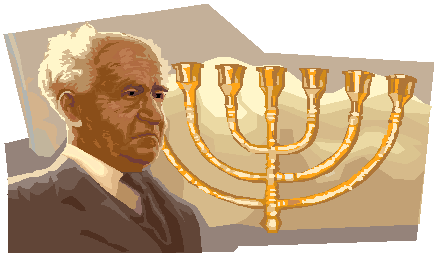 Jews
in the News Jews
in the News
-------------------------------------------------------------------------------------------------------- Like you, we're pleased when members of our community are praiseworthy, and are disappointed when they are blameworthy. Whether it's good news or bad news, we'll try to keep track of what's being said in general media about our fellow Jews. Our news spotters are Dan Brin in Los Angeles, Donald H. Harrison in San Diego, and you. Wherever you are, if you see a story of interest, please send a summary and link to us at sdheritage@cox.net and we'll acknowledge your tip at the end of the column. To see a source story click on the link within the respective paragraph. |
*The California Supreme Court has
turned down an appeal by Sara Caplan seeking to be shielded from an
order by a lower court judge that she testify in open court about what she
knows about possible evidence tampering in the Phil Spector murder
case. If she doesn't testify, Superior Court Judge Larry Paul
Fidler has said she will be jailed for contempt. The Copley News
Service
story by Matt Krasnowski is in today's San Diego Union-Tribune.
*U.S. Sen. Norm Coleman (Republican, Minnesota) is holding
hearings on the issue of how easy it is to by radioactive materials after a
sting operation by the Government Accounting Office with only a post office
box was able to obtain a license from the Nuclear Regulatory Commission.
The Associated Press
story is in today's Los Angeles Times.
*Assemblyman Lloyd Levine (Democrat, Van Nuys) has pulled from
the state Senate's active file his controversial bill to require most dogs
and cats in the state to be neutered. The measure encountered strong
objections in the state's upper house. The
story by Patrick McGreevy is in today's Los Angeles Times.
*House Judiciary Committee Chairman
John Conyers wanted White House aides to testify about the process leading
up to the grant of clemency that President George W. Bush extended to I.
Lewis 'Scooter' Libby, but White House Counsel Fred Fielding sent back a
letter saying Congress has no jurisdiction over the President's power in
such matters. The Associated Press story is in a package of
briefs in today's San Diego Union-Tribune.
*Israel's Foreign Minister Tzipi Livni is denying reports that a
resumption of peace discussions between Syria and Israel may be imminent. To
the contrary, she says, Syria has been playing "a dangerous game" in the
Middle East. The
story is in today's Ha'aretz.
*The San Diego Union-Tribune, in an
editorial, shares the indignation expressed by Reps. Bob Filner
(Democrat, San Diego) and Brian Bilbray (Republican, Oceanside) over the
opposition by the U.S. Boundary and Water Commission to the Bajagua solution
to Mexican sewerage that flows over the border.
*Shimon Peres, soon to be inaugurated as the president of Israel, has
agreed to also serve as president of the Jewish People Policy Planning
Institute, an organization which will seek closer links between Jews in the
Diaspora and in Israel. A
story
by Yaakov Lapin is on today's Y-Net News Service.
*George Skelton, a politics writer for the Los Angeles Times,
says in today's
column that there are many similarities between politics and sports,
which he used to cover when he was just starting out as a reporter. He
quotes consultant Dan Schnur on the importance of teamwork in the
political game.
*Lois Wyse, author and sloganeer who came up with the well-known
promotional line "With a name like Smucker's it has to be good," has died at
age 80. An
obituary by Claudia H. Deutsch of the New York Times News Service is in
today's San Diego Union-Tribune.
(Return to top)
Date: July
12, 2007

 News Sleuths:
Israel and
neighbors
News Sleuths:
Israel and
neighbors
Watching the media gathering
and reporting the news
of Jewish interest
Place: White House
Time: 10:30 am., Washington DC time
Press Conference Speaker: U.S. President George Bush
Source: White House transcript
Subjects: Libby, Chertoff
(Continued from above)
Q If I could just switch subjects for a second to another big decision you made recently, which was in the Scooter Libby case.
THE PRESIDENT: Yes.
Q You spoke very soberly and seriously in your statement about how you weighed different legal questions in coming to your decision on that commutation. But one issue that you did not address was the issue of the morality of your most senior advisors leaking the name of a confidential intelligence operator. Now that the case is over -- it's not something you've ever spoken to -- can you say whether you're at all disappointed in the behavior of those senior advisors? And have you communicated that disappointment to them in any way?
THE PRESIDENT: Michael, I -- first of all, the Scooter Libby decision was, I thought, a fair and balanced decision. Secondly, I haven't spent a lot of time talking about the testimony that people throughout my administration were forced to give as a result of the special prosecutor. I didn't ask them during the time and I haven't asked them since.
I'm aware of the fact that perhaps somebody in the administration did disclose the name of that person, and I've often thought about what would have happened had that person come forth and said, I did it. Would we have had this, you know, endless hours of investigation and a lot of money being spent on this matter? But it's been a tough issue for a lot of people in the White House, and it's run its course and now we're going to move on.
>>
Thank you. Thank you, sir. How comfortable are you -- sir, how comfortable are you with your Homeland Security Secretary saying, in the face of no credible intelligence of an imminent threat against the United States, that he has a gut feeling that one is coming this summer? And, sir, what does your gut tell you?
THE PRESIDENT: My gut tells me that -- which my head tells me, as well -- is that when we find a credible threat, I'll share it with people, to make sure that we protect the homeland. My head also tells me that al Qaeda is a serious threat to our homeland, and we've got to continue making sure we've got good intelligence, good response mechanisms in place, that we've got to make sure we don't embolden them with -- by failing in certain theaters of war where they're confronting us, that we ought to continue to keep the pressure on them. We need to chase them down and bring them to justice before they come home to hurt us again. (Jump to continuation)

Click the ad above to go to the "I'm there for you baby" website
The Jewish Grapevine

|
BUSINESS BRIEFS—Oscar and Olga Worm along with daughter Marla Worm
have scheduled a grand opening with ribbon cutting, speeches, llama rides,
clowns, music by Olga's father Al Jacobs and other band members, and,
yum, free samples from 2 to 4 p.m, Saturday, July 28, at West Coast Barbecue and
Catering, 6126 Lake Murray Blvd, La Mesa.
DEAD SEA SCROLLS—Diane Bell had a funny tale in her
column in the San Diego Union-Tribune about some locals at La Jolla
beach wondering why people were going to see the "dead sea squirrels."
Surely, they had overheard "Dead Sea Scrolls."
HATE —A petition campaign is underway to persuade Google to remove "Jew Watch," an anti-Semitic site from its search engine. Hillel Mazansky notes that currently if you type Jew into the Google browser, that site is among the first ones listed. Here is a link to the petition. Google has responded to the controversy, suggesting that the reason for the high listing for "Jew Watch" is because "Jew" is used as a derogatory adjective by anti-Semites, whereas Jews themselves are more likely to type in such words as "Jews" (plural), "Jewish" or "Judaism." Here's a link to the Google explanation. ...In El Cajon Superior Court, Timothy Michael Caban of Lakeside has pleaded innocent to a charge of fracturing an African-American man's skull at a bar in Lakeside, after allegedly tearing open his shirt to reveal the swastika tattoo on his torso. Bail was set at $250,000, according to a brief in today's San Diego Union-Tribune.
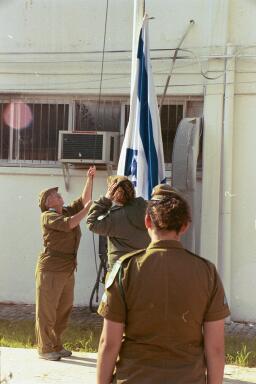
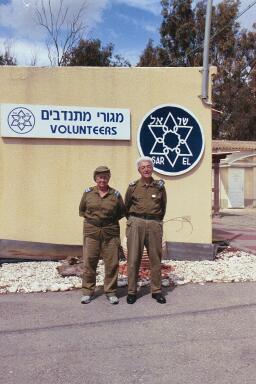
ISRAEL-SAN DIEGO COUNTY CONNECTIONS—Semyon and Rina Mogilevsky of Spring Valley recently returned from Israel where they volunteered at an IDF base near Tel Aviv. Mogilevsky said he and his wife were assigned to separate barracks by gender. "Toilets and showers were in the building close by; in that respect, staying in the Super 6 Motel would be considered as a luxury." There were compensating advantages, however, including "close proximity of friendly people." The Mogilveskys and other volunteers wore the same uniform as other soldiers, "we ate the same food and we were assigned to a regular type of work. From eight to four we worked in a warehouse stuffing field bags for military medics." Also, at least once per week, "we served in the kitchen doing dishes, sweeping floors, cleaning tables and preparing the dining room for the invasion of hungry soldiers." The dozen volunteers, who came not only from the U.S. but from Holland, Sweden, Belgium and New Zealand, freed regular soldiers for other duties. "We are very satisfied with our modest contribution to the life of the country which by its very existence means so much for many of us."
(Return to top)
Greater San Diego County |
UJF cites 90,000 good reasons
to implement its strategic plan
SAN
DIEGO (Press Release) —When the United Jewish Federation of San Diego County (UJF)
first opened its doors, the population in the county was no larger than Chula
Vista is today! Now, 70 years later, the UJF is pleased to say it’s still here,
it’s still growing, and it’s still focused on the same basic goal of
facilitating San Diego ’s Jewish community.
“The Federation has been a real leader in San Diego for a long time,” said UJF chief executive officer, Michael S. Rassler . “Although the needs of our community are shifting, they haven’t gone away,” Rassler said.
When the UJF incorporated in 1937, there were only 2,000 Jewish pioneers living in San Diego County. Just ten years later, the population jumped to 3,800. Twenty years later in 1967, the Jewish population more than doubled to 9,000 residents. In 1977, San Diego’s Jewish population reached 18,000. Today, as UJF celebrates its 70th Anniversary, the community has hit an all time high of 90,000! Unfortunately, UJF leaders confirmed what was long suspected while analyzing the results of the 2003 demographic study, that a sizable portion of the Jewish population is not affiliated with the organized Jewish community.
“In many Eastern U.S. communities, there is a geographic center for the Jewish community,” Rassler said. “But in western U.S. cities like San Diego , where the community is so spread out, there is no real center and we need to understand that.”
UJF leaders said this year they are poised to implement new strategies that will allow them to do what no other generation of UJF leaders has done—pinpoint the desires of San Diego ’s evolving Jewish population through use of a Strategic Plan.
“(The Strategic Plan) was needed because the Jewish community in San Diego has changed a lot over the years,” said Kenneth D. Polin, UJF chairman. “The Federation is 70 years old, but this is the first time it has actually developed a community-wide strategic plan.”
The Stategic Planning Report & Recommendations for the San Diego Jewish Community, which was unveiled in 2005, is helping the organization align its resources with those needs. “It’s very exciting,” said Polin “Instead of just planning what we are going to do from year-to-year, it’s an effort to take a quantum leap forward in preparing for the future.”
Despite the current challenge of raising affiliation rates, UJF leaders said the organization’s past achievements helped create a strong Jewish community for thousands of local San Diegans.
To the organization’s credit, many of the programs created by UJF’s founding fathers and mothers are still in place today. Additionally, many of UJF’s beneficiary agencies continue to thrive. Those agencies include (but are not limited to): Jewish Family Service which opened its doors in 1918, Hebrew Home (known today as Seacrest Village Retirement Communities)—a multi-branch retirement community founded in 1944, the Lawrence Family Jewish Community Center which was created in 1950, the Bureau of Jewish Education (now known as the Agency for Jewish Education) opened its doors in 1968, and Hillel of San Diego (a group of Jewish students) began its work in 1977 and five Jewish day schools.
In keeping with UJF’s mission of bonding San Diego’s Jewish population, the organization will implement a series of new strategies aimed at attracting unaffiliated, under-involved, and uninvolved Jewish residents to synagogues and the many programs and beneficiary agencies throughout San Diego .
The preceding story was provided by the United Jewish Federation
Judaism |
 People
of the Books People
of the Books |
The Mystery of the Kaddish: Its Profound Influence on Judaism by Leon H. Charney and Saul Mayzlish, Barricade Books, Fort Lee, NJ; ISBN 1-56980-300-5, 2006, $22.95, p. 236
WINCHESTER,
California—The Hebrew word Kaddish means sanctification, and it appears in
several forms, including, the Scholar’s Kaddish, Half Kaddish, Full Kaddish,
and Burial Kaddish. Whenever a member of the Jewish faith says, "I'm going
to say Kaddish," there is only one unambiguous meaning, "I’m going to say
Mourner’s Kaddish."
According to Jewish mysticism, when the body dies, the soul wanders for
seven days between the cemetery and its Earthly house, and does not fully
understand what happened. (Mirrors are covered in the house of mourning so
that the soul cannot see itself without the body and become further
frightened.) On the eighth day, the soul is brought before the heavenly
court. There, its life is examined for eleven months and a judgment is
rendered either to send the soul to Gan Eden (heaven) or Gehenna (hell).
The mourner recites the Kaddish for eleven months along with the community.
Together, they show support for the soul. In effect, those alive, through
the Kaddish prayer, come to the aid the deceased. Later, when needed, the
living will return to the gravesites asking the dead to intercede on their
behalf.
Authors Charney and Mayzlish focus their book, The Mystery of the Kaddish: Its Profound Influence on Judaism, on all the forms in two parts. Confronted with the death his mother, Charney wanted to “explore how one of the most integral prayers of the Jewish people is practiced in different communities and cultures under various rabbinical interpretations.” In order to accomplish this, the authors take us, in the first part, on their personal journey of discovery from the Middle East, to Europe, and then to Asia Minor. Along the way, we meet people who have a special, perhaps even mystical, connection with the Kaddish.
For example,
they heard various melodies of the Kaddish in Tel Aviv, and learned from the
cantors and congregants how these melodies added to the prayer’s intensity.
In Jerusalem, the authors visited the Merkaz Harav Yeshiva where they come
away understanding that the Mourners’ Kaddish “offers us a recipe for life,
teaching us that we may not delay our assigned tasks and the demands made
upon us. It reminds us of an hour glass, where the sand inexorably runs
down, where things which might appear to be minor are major and vice-versa.”
After a trip through the Holocaust Museum, also in Jerusalem, they went
away recognizing that the Kaddish prayer, in the post-World War II world, is
the ultimate acceptance of God’s actions.
In Poland they saw how people reacted to the prayer through the eyes of the
late Rabbi Levi Yitzchak of Berdichev, who perceived the Kaddish as personal
contact with God. The Kaddish became a longing for the re-establishment of
the Temple in the Czech Republic, and in Turkey it was a search for meaning,
as a person “may even question the very existence of God, the same God who
took one’s dear one; yet ultimately arrive at the truth, and faith in the
justice of the Creator.” The authors’ extensive travels between Europe,
Asia, and the Middle East allow us to conclude that the meaning of the
Kaddish prayer is as personal as the one reciting it.
(Jump to continuation)
 The Jewish Sports Fan
The Jewish Sports Fan
 |
Bud Selig should take
Rev. Jesse Jackson's advice about Barry Bonds
SAN DIEGO—It's not every day that we find ourselves agreeing with the Rev. Jesse
Jackson, but his criticism is on target about the cold shoulder that baseball
commissioner Bud Selig and other officials are giving San Francisco Giant
slugger Barry Bonds as he attempts to surpass Henry Aaron's home run record.
Jackson was quoted today in the San Diego Union-Tribune
as saying, "if you can't prove it, embrace him and his record."
Naturally, Selig is a bit squeamish about seeming to make too big a deal over a
record that some believe was steroid-induced, but until such time that is an
established fact, if it ever is, we all were brought up to believe that a person
is innocent until proven guilty.
So Selig ought to try to be at the games leading up to the big 756, and after
the mighty swat, he should have a press conference with Bonds at his side.
When a reporter asks if the record still will stand if Bonds is found to have
used performance-enhancing drugs, Selig should respond "the record will stand no
matter what. If what you say were to come to pass, it would be a record
with an asterisk by it. Today we need to deal in facts, not in
speculation. I'm here to congratulate Barry." —Donald H. Harrison
(Return to top)

{Marc Kligman, who combines being a
sports agent with his life as an observant Jew, invites you to listen. Click on
the ad above for more information}
______________________________

News from the Israel Baseball League |
Home run
derby shows ADL's Abe Foxman how
they settle a tie game in Israel Baseball League
GEZER, Israel—July 12- It took a homerun derby for the Bet Shemesh Blue Sox to top the Ra'anana Express 6-5 on a night in which the director of the Anti-Defamation League, Abe Foxman, threw out the game's ceremonial first pitch.
Down by four runs through four innings, the Blue Sox came charging back on back-to-back homeruns from star sluggers Jason Rees and Johnny Lopez in the top of the fifth. With the game tied at five runs apiece through seven innings, IBL rules dictated a homerun derby and the Blue Sox responded.
Bet Shemesh won in the first round on one home run apiece from Californian Gregg Raymundo and Lopez once again. Scott Jarmakowicz of Florida added icing to the cake with two blasts of his own as Bet Shemesh won the derby 4-0 to improve to 11-2.
   TOP—Umpire Bob Alexander, Netanya Tiger catcher Ophir Katz, Modi'in Miracle batter Adam Harwood, and Netanya pitcher Mike Kerfeld form a timeless tableau. MIDDLE, Modi'in centerfielder Alaberto Paulino gets a handshake from assistant coach Tony Ferraro as he transits third base during a home run lap. BOTTOM: Moish Lewis, facing camera, gets a high five from Modi'in catcher Steve Litvack. Yechiel Stein photos |
|
1 2 3 4 5 6 7 R H E
Petach Tikva 0 0 0 0 0 0 0 0 4 0
Tel Aviv 0 0 0 0 0 3 x 3 4 1
W: Dan Rothem (1-1); L: Abel Moreno (1-3); HR: None
Standings:
Team W L % GB
Bet Shemesh Blue Sox 11 2 .846 –
Tel Aviv Lightning 9 3 .750 1.5
Modi'in Miracle 7 5 .583 3.5
Netanya Tigers 4 6 .400 5.5
Ra'anana Express 5 9 .357 6.5
Petach Tikva Pioneers 1 12 .077 10.0
Friday it's the Bet Shemesh Blue Sox at the Tel Aviv Lightning at 10 am at
Sportek Field and the Netanya Tigers at the Petach Tikva Pioneers at 10 am
at Yarkon Field at the Baptist Village. At noon the Modi'in Miracle host the
Ra'anana Express at Gezer Field at Kibbutz Gezer. For directions to the fields
visit
(Return to top)
|
Story Continuations |
And so it's a -- this is a serious issue that is going to outlast my presidency. As I say, this is the beginning stages of what I believe is a ideological conflict that -- where you've got competing visions about what the world ought to be like. What makes this more difficult than previous conflicts is that there's the asymmetrical use of power -- in other words, IEDs and suicide bombers are the main tactical device used by these thugs to try to achieve strategic objectives.
Their objective is to impose their vision on the world. Their objective is to drive the United States out of parts of the world. They want safe haven. They love a society where women have no rights, just like the society that they worked to impose with the Taliban on the women of Afghanistan. That's their vision. And it's in our interest to defend ourselves by staying on the offense against them. And it's in our interest to spread an alternative ideology.
We have done this before in our nation's history. We have helped people realize the blessings of liberty, even though they may have been our enemy. And freedom has an amazing way of helping lay the foundation for peace. And it's really important, as we head into this ideological struggle in the 21st century, that we not forget that liberty can transform societies.
Now, the interesting debate is whether or not a nation like Iraq can self-govern; whether or not these people even care about liberty. As you've heard me say before, I believe -- strongly believe -- that freedom is a universal value; that freedom isn't just for Americans, or Methodists, that freedom is universal in its application. And so when they voted in '05, I wasn't surprised -- I was pleased that the numbers were as big as they were, to defy that many threats and car bombers, but I wasn't surprised.
And this is the real challenge we face. And Iraq is just a part of a broader war against these jihadists and extremists, Mark. It is a -- we will be dealing with this issue for a while, just like we dealt with other ideologies for a while. It takes time for ideologies to take root.
I firmly believe that you'll see the democracy movement continue to advance throughout the Middle East if the United States doesn't become isolationist. That's why I've told you that I'm making sure that we continue to stay diplomatically involved in the region. Condi Rice and Bob Gates will be traveling there in early August, to continue to remind our friends and allies that we're -- one, we view them as strategic partners; and, secondly, that we want them to work toward freer societies, and to help this Iraqi government survive. It's in their interests that Iraq become a stable partner.
And I believe we can achieve that objective. And not only do I believe we can achieve, I know we've got to achieve the objective, so we will have done our duty. This is hard work. And one of the things I talked about in the opening comments was, do we do it now, or basically pull back, let the Gallup poll or whatever poll there are decide the fate of the country? And my view is, is that if that were to happen, we would then have to go back in with greater force in order to protect ourselves, because one of the facts of the 21st century is that what happens overseas matters to the security of our country.
Date: July
12, 2007
Place: State Department
Interviewer: Brit Hume, Fox Cable Network
Interviwee: Secretary of State Condoleezza Rice
Source: State Department transcript
Subjects: Terrorist threat to U.S.; upcoming Mideast trip
QUESTION: Do you sense -- do you share the gut feeling expressed by the Secretary of Homeland Security this week that this would be a -- this is a particularly dangerous time for the United States in terms of its vulnerability to an attack or the possibility of an attempt to (inaudible?)
SECRETARY RICE: I'm certainly concerned about it. It's a period of time in which there is a lot of intelligence, a lot of chattering that would suggest that there's an effort to plan an attack against the United States. But it's -- as Mike has said, you know, there's nothing that appears concrete or imminent. But of course -- and we always have to be vigilant because the truth of the matter is it's a kind of unfair fight. The terrorists have to be right once and we have to be right 100 percent of the time. But I think Americans can know that there's been a very active program led by Mike Chertoff and Fran Townsend, the President's Homeland Security advisor, to make sure that we're doing everything that we can to share intelligence with our allies abroad, to work with our local governments and city leaders and perhaps most importantly to be sure that we're doing what we can to disrupt activities when we see things happening abroad.
>>
QUESTION:
You've got two trips coming up, one of them in the near-term and a later one
with Secretary Gates. What do you expect to achieve in the first trip?
SECRETARY RICE: Well, I will go -- now, I will go to the Middle East and see the Israelis and the Palestinians at the same time that I go out with Secretary Gates. Obviously, there is a very big regional dimension to everything that we're doing at this point in time.
Iraq has to be seen in a regional context. And the reason that Secretary Gates and I are going out is that we want to consult with Iraq's neighbors, many of whom are our very close allies in the region. We want to talk about what the way forward looks like in Iraq, both in terms of what the United States needs to do, but also in terms of what they need to do to support the development of a stable and democratic Iraq.
I will undoubtedly meet with some of the allies that I've met with in the past. I've met in the past with the Gulf states and Egypt and Jordan, in a forum to talk about the regional dimension of this. And so this is really to help set a concrete regional context for Iraq. That's why Secretary Gates and I are going out.
QUESTION: So there's an essential effort here to try to get these countries to do more to help the outcome in Iraq?
SECRETARY RICE: Well, it's to do that. They do need to help the outcome in Iraq. They are as dependent for their security in the long-term on a stable Iraq as we are. Some might even say even more, because it's their neighborhood that will be destabilized if Iraq is in chaos.
But we
also want to talk about their security. When we sent a carrier into the Persian
Gulf, into the Gulf region, when we made clear that the United States remains
committed to its long-term security interests and those of the allies,
commitments that have been there, essentially, since Franklin Roosevelt, we do
want to talk to them about their security needs and how -- in what is a vastly
changing region, but a challenging region. Given also the Iranian problem, we
want to talk to them about how we jointly deal with those challenges.
(Return to top)
Olmert—Al Arabiya
(Continued from above)
Interviewer: Are you telling me, Mr. Prime Minister, that you for your part made no mistakes in this war, even though the Winograd report, which has received a lot of attention in the Arab press, indicates that there were indeed fatal problems with the management of the war?
PM Olmert: I don’t want to get into a debate about the Winograd report through Al Arabiya. Of course there were mistakes. The question is not the mistakes. The question is internal, inside Israel, if the army units should have been deployed in one way or another. The army will surely find the proper response to this very important question, but this doesn’t address the fundamental question.
In the
fundamental question, on July 12, Hizbullah controlled all of southern Lebanon
and today Hizbullah does not control southern Lebanon. On July 12, Hizbullah had
control of the border with Israel and today Hizbullah does not control the
border with Israel. On July 12, Hizbullah could have done whatever it wanted to
in southern Lebanon and today the Lebanese army is there and the international
UNIFIL army is there, with soldiers from Moslem countries, Malaysia, Indonesia,
Turkey, other places and European states.
Interviewer: You did say that
[UN Security Council Resolution] 1701
is perhaps the clearest accomplishment of the Lebanon war. But then, on the
other side as well, in Hizbullah they say, "It would only take 24 hours to
deploy again in the south." Do you really think this is a non-liquid situation
that can be controlled?
PM Olmert: Look, I don’t want to wage a war of slogans. It’s not my way. I don’t need this. It’s a fact that there is an international army in Lebanon and this international army has gone into Hizbullah's bunkers, taken out weapons and exploded them. And meanwhile we don’t see Nasrallah strolling along the streets of Beirut. Ask him why not.
Interviewer: I'm asking you. If he goes for a walk, will something happen to him? Is he at risk?
PM Olmert: I don’t know. Ask him why he doesn’t walk the streets of Beirut.
Interviewer: He's being careful, in the meantime, but is he a target in Israel's eyes?
PM
Olmert:
I can tell you one thing: I don't wage wars of honor or personal wars.
Interviewer: The army, in any case - I'm getting back to the subject of
the army. In the army they say, and I think the Minister of Defense talked about
this as well, that after the war there was a kind of deterioration in Israel's
deterrent ability and this ability needs to be rebuilt. Deterrence is something
you don't need to use, when it exists. Do you think this is the right way? Will
something like this happen?
Prime Minister: No.
Interviewer:
There is a fear that in Gaza, with Syria, it will erupt, perhaps to restore the
power of deterrence. At least that’s what the Arab in the street is afraid of.
PM Olmert: I'm glad of this opportunity to speak on al Arabia, because I
imagine that a great many Arab residents in many Arab countries will hear us. We
have no interest at all in fighting Arabs anywhere. We are not looking for a
fight. We want to make peace. We do not need to restore deterrence; we have
acquired deterrence.
Let's look at things the way they really are. Prior to July 12, there was no
deterrence. If there had been, then Hizbullah wouldn’t have attacked us. The
Hizbullah attacked us because it did not feel deterrence from Israel’s side.
After the war, Nasrallah felt deterred. It's a fact that he said if he had know
then what he knows now, he wouldn’t have started it. Now that he knows, he's not
so eager to start anything. So I don’t think we have a problem with deterrence.
I think
there is a problem that the Arab world needs to cope with, and that problem is
that you have too many extremists, fundamentalists who deal in terror. They pose
a danger, and not only to Israel. They endanger the entire Arab world. Tell me,
have you ever seen a more brutal murder of Palestinians than what Hamas did to
Fatah? No Israeli did that. Israelis didn’t do it; Israeli soldiers didn’t do
it. We never treated the Palestinians like that. Hamas murdered Fatah in the
most brutal way in the world. 160 people were murdered. Sick people were pulled
out of their hospital beds, thrown off the roof, and smashed. Completely
defenseless civilians were shot in the legs and bodies.
This is part of the Arab reality. It has nothing to do with us. It’s part of the
extremism that exists in the Arab countries; it’s part of the extremism among
certain Islamic movements; and it first and foremost harms the Arab states and
the Moslem civilians. The overwhelming majority of Moslems are people who want
peace. I have no doubt that they hate this violence.
Interviewer: Sir, recently you have spoken much about your fear that perhaps the Syrians will have a misconception of what you described and things will accidentally ignite. Are you actually afraid that the situation might deteriorate to the point of war?
PM Olmert: I would be very happy to make peace with Syria. I don’t want to fight Syria. I am saying this to Bashar Assad: "Bashar Assad, you know that I am willing to negotiate peace directly with you. And you know, and you always say that you are willing to negotiate only through the Americans." Bashar Assad does not want to sit down with me. He wants to sit with the Americans. The Americans don’t want to sit with him. I am willing to sit with him, if he is willing to sit with me. We will talk about peace, not about war. I don’t want to fight Syria.
Interviewer: So are you inviting him to Jerusalem?
PM Olmert: Assad has already heard from me. He heard many things from me. I can’t tell you what he knows.
Interviewer: I would like to hear.
PM Olmert: He will confirm to you that he heard from me. But his answer is that he wants to talk to the Americans, but the President of the United States said, "What do you want from me? I don’t want to come between you and Ehud Olmert. Do you want to talk to Ehud Olmert? Does Ehud Olmert want to talk to you? Sit down and talk." I am willing to talk to him.
Interviewer: Where?
PM Olmert: Anywhere he agrees to.
Interviewer: Recently I was in the Golan covering a combined forces exercise. I got the impression that a Syrian minister spoke on "Al Arabiya" and said, "Read this as if Israel is preparing itself for war; it will start the fighting and the Syrians will oppose the war." He said that the time of sitting and waiting for negotiations is over.
PM
Olmert:
I don’t know how to respond to something some Syrian minister might have said.
There are too many Syrian ministers talking and too many Israeli ministers
talking. Not everyone who talks needs to be taken seriously.
We are not preparing for war, that I can tell you. We are not preparing for war.
We have an army; the army needs to practice; that’s natural and normal. The
Syrian army does drills; the Israel army does drills; other armies do drills.
It's part of life. We are not preparing for war. We have no interest in war.
Interviewer: The assessment is, even if things are not said publicly, that the United States really isn’t very happy with the idea of Israeli-Syrian negotiations. Was that your impression?
PM
Olmert:
I suggest you talk to the Americans. Hear their response. I am not their
spokesman; I cannot speak for their policy.
Interviewer: You always talk like President Bush about this matter of the
"axis of evil" - Iran, Syria, Hizbullah, I don’t know - maybe Hamas as well. I
mean, wouldn’t it be logical to start even some kind of discussion with the
Syrians?
PM Olmert: As I told you before, I want to talk to the Syrians and for the Syrians to talk to me. They want to talk to America. I want to talk to them. I told them that I want to talk to them.
Interviewer: I’ve felt recently that Israel seems to have relinquished, I would say, its policy of evasiveness on the nuclear issue. There are many quotes from previous interviews with you in the world press in this direction. Is this some kind of threat against Iran, which is also trying to go nuclear?
PM Olmert: I think I’ve said this many times, and I reiterate - we have no other policy. Israel will not be the first to introduce nuclear weapons into the Middle East. This is our past, current, and future policy. We will not be the first to introduce nuclear weapons into the Middle East.
Interviewer: Are you counting on the attempt by the Americans and the world to prevent Ahmadinejad from having a nuclear bomb within a few years? Are you relying on that?
PM Olmert: I am not relying blindly on anything. I am troubled, but I believe that the Americans truly wish to prevent the Iranians from acquiring unconventional weapons and that they will do many things to prevent this, and I hope that along with the Russians and Europeans, through Security Council resolutions, they will succeed in preventing these things.
Interviewer: Sir, Hamas now virtually controls the Gaza Strip and there are also signs that it can impose quiet if it wants to. They released Al Johnston. They say they control the Islamic army. Why are you in fact convinced that it isn't a partner for negotiations, when for years the PLO wasn’t a partner, and in the end it signed the Oslo Accords with the State of Israel?
PM
Olmert:
Tell me, how is possible to trust a Palestinian factor who murders Palestinians
like Hamas did? Is that the normal agenda for Palestinians? That kind of murder
of Palestinians by Palestinians, like Hamas perpetrated? If they murder
Palestinians like that, what might they do to us, if they could?
So I am extremely cautious. When I see a murder organization, it's a murder
organization. When I see how they murder Palestinians, it shocks me. We do not
hate the Palestinians. I'm telling you, as an Israeli civilian, as a Jew who
grew up in this country, who has seen Arabs his entire life, I'm telling you no
one understands Palestinian suffering better than we do. I never claimed and
never felt that suffering is only our lot. I have no doubt that the
circumstances of the establishment of the State of Israel involved suffering for
a great many Palestinians. Many Palestinians suffered and suffering was part of
their existence for many years.
We are not indifferent to Palestinian suffering; we do not ignore Palestinian suffering. We feel it and respect it, and we want to find a way to end it, to end our suffering. We have suffered here; we were forced to fight for decades against our will. We had to defend ourselves from anti-Jewish, sometimes anti-Semitic, anti-Zionist extremism that accumulated over the years, but we always wanted peace. We made peace with Egypt; we made peace with Jordan; we signed agreements with the Palestinians. We want to continue solving the problems with the Palestinians to help them find a solution to their suffering. We are willing to be part of this effort.
Of course there have to be two states. A national Palestinian state and a national Jewish state. Jews will come to the Jewish state. Palestinians and Palestinian refugees will come to the Palestinian state. We are willing to be part of the attempt to solve this. What do you think? That when I see a Palestinian’s suffering it doesn’t move me? That it doesn't weigh heavily upon me? That it doesn't make me sad? I think there has to be an effort in which we invest most of our energy in ending the mutual suffering that is an integral part of the reality in the Middle East.
Interviewer: Sir, if you were a Palestinian in some refugee camp, would you really believe Israel and the United States that after almost 60 years there is now a solution, that Israel is really serious? Could you as a Palestinian trust Israel?
PM
Olmert:
First of all, I would say that if I were a Palestinian, I would ask myself
questions about the Palestinian leadership, and how serious the Palestinians
are. How willing are the Palestinians to abandon the way of terror and fighting,
and to make peace and take care of the Palestinians? Where are the Palestinians
who care about Palestinians? I care more about the Palestinians than some
Palestinians do. Hamas murders Palestinians. It doesn’t care about Palestinians.
It cares about some kind of extreme, violent, fundamentalist worldview that
cannot bring any decent future to the Palestinians.
If I were Palestinian, and there are many Palestinians like this, who live in
various places in the world, who are in touch with us. What, do you think we
live with some kind of distorted perception, always typical of anti-Semites,
that the Palestinians have something wrong with them? The Palestinians, thank
the Lord, are people who want what every person wants. They want to live; they
want to get up in the morning, send their children to school; they want to have
a good life; they want what every normal person wants.
Unfortunately, the Palestinian movement includes extremist elements who never accepted the existence of the Jewish state. Not everyone. I believe Abu Mazen. I believe Salaam Fayyad. They say it and act like it. I don’t believe Khaled Mashal. Anyone who can murder Palestinians as he did can murder Jews too. I am not willing to speak with him; I am willing to speak with Palestinians who want to make peace, and together with them to try to solve the human problems and the problem of suffering caused to the Palestinians, like the suffering caused to the Jews.
Interviewer: You, sir, noticeably always speak a lot in praise of President Mahmoud Abbas, but some, even on the Palestinian side, say that these bear hugs only weaken the man. That means he is perceived as being dependent on Israel and the United States, so don’t you have any second thoughts in this matter, even media-wise?
PM Olmert: In this matter there is an expression meaning: "Damned if you do and damned if you don't." If I were to condemn Abbas, you would say, "Here, you see, you don’t want to talk to us. There is someone decent and moderate to talk to, and you don’t want to talk to him." If you say that he can be talked to, then you immediately turn him into a collaborator of the State of Israel.
Listen: to avoid any misunderstanding, I am against Abu Mazen. When he tells me how he wants to solve the problems, I am opposed to many of the things he says, because I think he is saying things that are not good for me. They are good for the Palestinians; they are not good for the State of Israel. And we have some very difficult disagreements. He is not an easy man. He negotiates much more effectively to benefit the Palestinians than the murderers do. There's nothing to talk about with the ones who murder, like Khaled Mashal. The whole world hates and dismisses them.
Abu Mazen is a very difficult opponent, because everyone likes, respects and wants to help him, So there is no bear hug and we are not enamored of him and we do not hate him. We respect him as the Palestinian leader who has to be sat with and we are willing to sit with him.
Interviewer: You say that everyone hates and cannot stand Hamas, but a democratic choice was made by the Palestinian people who put Hamas in power. Things inside Palestine developed into a civil war. Almost all nations have had civil wars; millions fell on the road to independence.
PM Olmert: Listen, before Hamas was elected, Abu Mazen was elected. So, first of all, with all due respect, the one who was elected by the Palestinian people to lead them is Abu Mazen. Secondly, what percent of the votes did Hamas receive in the elections? 35%. Is that all of the Palestinian people? That’s some of the Palestinian people. The Palestinian people did not elect terror. Hamas did not take advantage of the opportunity. When they were elected, they could have decided to become a political organization and to cease terror. Instead, they thought that the elections gave them a mandate for their terror and so they thwarted themselves and thwarted the Palestinian people.
Interviewer: But they are talking about the '67 borders, which is considered a radical turnaround in Hamas thought.
PM Olmert: My friend, Hamas says they do not want peace with Israel. Period. So which borders are you speaking of? They are not talking about the '67 borders as borders for peace with the Jewish state that will be within those borders. They are talking about the '67 borders as a transit station before destroying the State of Israel. Do you think that I can accept that? Do you think that any kind of serious party in the world is capable of accepting that, that someone seriously sees this as a kind of basis for a future solution?
Interviewer: Recently I heard Ephraim Halevy, the former head of the Mossad, and other generals here and there, say that perhaps peace really is made with enemies; peace cannot be made with Fatah, but with the Palestinian people, of whom Hamas is in fact an integral part. Why is nobody trying to think of a way perhaps to attract Hamas away from its enmity with itself?
PM Olmert: I think you need to direct that question to Hamas. I have said many a time that if Hamas accepts the principles of the Quartet, recognizes the existence of the State of Israel and the right of the State of Israel to exist, and stops the terror, we will sit with Hamas. I did not rule that out. But sitting with an organization that says it’s looking for a way to kill me? No one is going to kill me. No force can destroy us. It can only cause us suffering. I don’t want to cause suffering. I don’t want to cause suffering to the Jews, I don’t want to cause suffering to the Arabs, and I don’t want to cause suffering to the Palestinians. The Riyadh Commission said that the Arab League’s peace initiative is a basis. Come to me; let’s sit and talk about it.
In fact, I’m not running away from anything. I’m not avoiding anything. I say ahlan wa sahlan. Let’s sit and discuss the Arab peace initiative, if that's what you want. We will sit with the Palestinians and talk. I sit with Abu Mazen; we argue; it's very difficult with him, but we talk about peace. About the Arab peace initiative. If they come here for a discussion, I will be very happy. If they invite me somewhere else to discuss the Arab peace initiative, I will go discuss it.
Interviewer: One last question, by your leave, sir. Yesterday we heard that the ministers' committee is proposing a new law making Gaza a foreign entity, and the question is whether you honestly believe that someone who lost Gaza to Hamas can reach a sustainable agreement with Israel, or perhaps you also have other thoughts and ideas about the organization?
PM Olmert: Listen well. There is no ministers' committee, there is no such plan, and it's all nonsense. Do you know what nonsense is? It's all nonsense. There never was such a thing. One and half million Palestinians live in Gaza. Do you think that I believe they can be separated from the rest of the Palestinians? That’s a fantasy that someone sold you.
We do not intend to separate Gaza from Judea and Samaria. We will fight Hamas if Hamas continues with terror, but that is unrelated to the people living in Gaza. We will send them humanitarian aid. We will strive to help them. They do not need to be punished because of crazy, extremist, violent leadership that wants to kill Palestinians and wants to kill the chance for peace.
Interviewer:
Thank you, Mr. Prime Minister, for this interview.
(Return to top)
Olmert-Judaism...
(Continued
from above)
And yet the question still
remains, what is the significance of the Israeli part in my identity? When I'm
asked I say, yes, first of all I am Jewish and then, naturally I'm an Israeli.
Now we are all Jews, but in most cases when you are asked, I guess, I believe, I
want to believe, that almost everyone of you when asked will say, first I'm
Jewish, then I'm American, I'm French, I am Mexican, I am Canadian. And I ask
myself, this combination, I'm Jewish-American, I'm Jewish-Israeli, how does it
impact our perception as Jews when the second part of it may be so different, or
does it? This is a question which I think ought to be at the basis of some of
the discussions that will take place here because I think, and in advance I
apologize
to any of you who may feel offended by this observation. So I hope it will not
sound as typical Israeli arrogance, which is very rare anyway as you know. I
think that there is a certain significance to the Israeli aspect in the overall
perception of Jewish identity which is different and may be of exceptional
importance in comparison to anything else. Do we fully understand what it means
for each and every one of us?
I think that, and it occurred to me to give it a lot of thought when I became
mayor of Jerusalem - when I became Mayor of Jerusalem, I couldn't escape the
thought. I know there was a certain immodesty involved, but I thought to
myself, for so many generations, the most significant, the most powerful ethos
in Jewish history was this four word prayer, that every Jew remembered, even
when he didn't remember anything else about Jewish observance, which was "Next
year in Jerusalem". And I thought to myself after all these years, after all
these generations that they were praying to return to Jerusalem, I was fortunate
to become the Mayor of Jerusalem. What does it mean in terms of the historical
perspective for me as part of a nation? And then, I actually convinced myself
that there was one thing, if I was asked what is the one single emotion that we
as Jews can distinguish and separate from every other and say, this is perhaps
the most characteristic emotion of Jewish history. It's not an easy question
and there may be different answers. My answer is, I think yearning all our
lives, all our history, we are looking forward for something that will happen
and maybe this is our destiny, that we will look for it forever, but that
something is always connected with this place.
We are not looking forward as Jews for anything which is not part of the land of
Israel, perhaps of this city. As human beings, who are looking for, supporting,
believing in moral standards, we can think of different historical events that
took place in many other places in the world, but as Jews the one single thing
that is the driving force of everything that we were praying for, and crying for
and perhaps dying for all our lives, was to regain something that is sometimes
very hard to define but which belongs here, and therefore when we define
ourselves as Jews, there is no way that we can escape the significance of Israel
in this, as broad a definition we can give of ourselves.
And while I know that many of you are very proud and for good reason, of the
other aspect that I outlined before when you are asked who you are and you say,
we are Jews, and we are British, we are Jews and we are Canadian. And you have
a good reason to be proud of your British side and of your American side and of
your Canadian side, and we are very proud of you as Jews, we Israelis, because
each and every one of you and many others, have manifested over many years that
Jewish solidarity, and being Jewish is a very essential part of everything that
drives you. And also I think what characterizes all the people sitting here and
many who are not part of this particular event, is that the Israeli part is
something that can't be ignored in whatever they do as Jews. And I believe that
the connection between the two is the focus, more than anything else, of not
just who we are, but what future we have.
I hope, I pray, I wish, that in the short time that you will be sitting and
discussing the issues, you will try to offer some ideas of, even when not all
the Jews are making Aliyah to Israel which in my mind, in my heart, is the
ultimate answer, even when this is not possible, how we can build up the
combination of our Jewish identity into the realities, the constraints, the
pains and the expectations of this place, to make it more meaningful and more
promising to each and every one of us. Thank you very much.
The preceding article was provided by Prime
Minister Olmert's office
(Return to top)
Lady Bird Johnson...
(Continued from above)
A life-long lover of the environment, Lady Bird Johnson is best known for the Beautification Act of 1965, which is widely credited as the “Lady Bird Act.” The legislation encouraged efforts to make the nation’s Interstate system more scenic and limited billboards that could be posted along roadways.
So, as millions of American families go on summer vacations, they can thank Lady Bird Johnson for the beautiful wildflowers that bloom along the highways.
It was the first of a major legislative effort undertaken by a First Lady – and helped to transform the very nature of the Office of the First Lady.
Lady Bird began her beautification efforts with the “First Lady’s Committee for a More Beautiful Capital” in 1965.
Although it is largely known that the First Lady worked to have flower beds and dogwood trees planted throughout the Capitol, Lady Bird also worked to address more urban societal concerns here in the District of Columbia, such as crime, public transportation, mental health and recreation.
And to Lady Bird, beautification meant much more – it embodied a deep commitment to the conservation of this country’s natural resources.
In her own words, it meant: “clean water, clean air, clean roadsides, safe waste disposal and preservation of valued old landmarks, as well as great parks and wilderness areas.”
As First Lady, she was often considered a “shadow Secretary of the Interior.”
When the White House Conference on Natural Beauty was convened in May 1966, Lady Bird kicked off the conference proceedings by asking this important question: “Can a great democratic society generate the drive to plan, and having planned, execute projects of great natural beauty?”
And thanks in part to her efforts, the Johnson Administration helped to oversee
some 150 legislative accomplishments for the environment, including:
· The Clean Air Act;
· The Wilderness Act of 1964;
· The Land and Water Conservation Fund;
· The Wild and Scenic Rivers Program; and
· Numerous additions to the National Park system.
Lady Bird Johnson helped to ensure protection of some of America’s finest natural treasures, including the Grand Canyon, the Hudson River Valley, and perhaps closest to my heart, the majestic California Redwoods.
Lady Bird Johnson was also closely involved in President Johnson’s civil rights efforts and his “Great Society” campaign, particularly on the Head Start program.
She helped to ensure that low-income youngsters are given the opportunities they need to compete fairly and equally when they enter elementary school.
So, she truly left her stamp as a First Lady.
After leaving the White House in 1969, Lady Bird turned her attention once again
to wildflowers. She was instrumental in launching the National Wildflower
Research Center in 1982, which was later renamed in her honor.
The Center has been central to helping preserve many species of wildflowers and
plants, which are increasingly sensitive to the challenges of climate change. In
fact, today, some 30 percent of the world’s wildflowers and other native flora
are endangered.
Lady Bird Johnson was one of America’s finest citizens.
And she was recognized as such. In 1977, the former First Lady was presented with America’s highest civilian award, the Medal of Freedom, by President Gerald Ford. And in 1988, she received the Congressional Gold Medal from President Ronald Reagan.
As Laurance Rockefeller aptly stated when Lady Bird was awarded the Conservation Award for Lifetime Achievement in 1977: “She’s a role model for leadership responsibility for women. That’s a big part of her legacy, above and beyond the environment.”
Lady Bird Johnson will be very much missed. And I offer my personal and deepest sympathies to her family.
Thank you, I yield the Floor.”
The
preceding article was provided by the office of Senator Dianne Feinstein
(Return
to top)
Kaddish...
(Continued
from above)
Charney and Mayzlish propose, in the second part, the idea that the Mourner’s Kaddish became significant during the time of the Crusades and Black Plague. It was during these eras that thousands and thousands of Jews were killed from cruelty born out of religious fervor and from unknown natural causes. Looking for ways to give solace to families, particularly orphans, the rabbis looked to their Christian neighbors and adopted the ritual of communal prayer as the formal grieving process. To find that prayer, the rabbis needed to look no further than the Kaddish. To add the communal element, they required a minyan, a group of ten or more men, for Mourner’s Kaddish to be recited. The idea is interesting, and certainly consistent with our knowledge that by the thirteenth century Mourner’s Kaddish was already part of community prayers.
Originally, the Kaddish was not associated with prayers. Sometime between the First and Second Temple periods, the Kaddish developed as a poem of praise. Teachers recited it at the conclusion of study and before dismissing the pupils with the hope, through prophetic verses, of the speedy arrival of the Messiah. The Scholar’s Kaddish asks its listeners to praise God for the world as He created it; asks God to quickly establish His kingdom (implying that the Messiah needs to be sent immediately); profusely gives honor to God’s name; asks God to accept the prayers and supplications of the Jewish people, especially those dedicated to the teaching and learning of God’s laws; and to grant them peace, mercy, nourishment, and salvation; and concludes with a plea for a time of peace.
Since the Kaddish was not intended to be a prayer, it was spoken in Aramaic, the language of the people at that time, rather than the holy language of Hebrew, which is the custom followed to this day. Slowly, as the synagogue and prayer supplanted the Temple and its sacrificial system of service to God, the Half Kaddish became a prayer that separated minor parts within a service and the Full Kaddish marked the end of the service. The Burial Kaddish and Mourner’s Kaddish came much, much later.
After the
destruction of the Second Temple, Pharisaic Judaism became normative Judaism,
and along with it came the belief in reward and punishment after death.
Subsequently, Judaism adopted the idea that a father could be saved from the
tortures of Hell if, after death, his son would recite the Kaddish and the
congregation would respond with the praise of God’s name.
During the early period of the Gaonim, the sixth and seventh centuries, the
Scholar’s Kaddish took on eschatological significance. At the end of days, God
would reveal a new Torah to the pious, and Zerubbabel (the grandson of
Jehoiachin, last King of Judah; leader of the first wave of Jews returning from
the Babylonian Captivity after the destruction of the First Temple; and the one
who laid the foundation of the Second Temple) would recite the Scholar’s Kaddish
“with a voice reaching from one end of the world to the other; to which all
mankind will respond ‘Amen.’” Lamm, in his well-written book, The Jewish Way
in Death and Mourning, said that it became accepted to recite the Scholar’s
Kaddish at the death of a scholar, and then overtime came to be applied to
everyone.
Although the
Mourner’s Kaddish reflects pain and anguish, it does not mention death. Instead,
like the Scholar’s Kaddish from which it is derived, it begins with the command
to exult and sanctify God’s great name, to which all within ear shot replied,
“Amen.” Then the prayer continues,” in the world that He created according to
His will.”
Now, a scholar’s frame of reference differs from that of a mourner. For the
scholar, how the world operates is an intellectual exercise, for the mourner,
the Kaddish is the highest pronouncements of realism and love. The mourner, in
effect, declares that even though I know that suffering and death are
inevitable, and I don’t understand why this is happening to me, now, I still
praise and sanctify You, God. The prayer is said in Aramaic, except the last
line, which is said in Hebrew. “May the One who makes peace in the heavens, also
make peace for each of us and for all the People of Israel, and let us say,
‘Amen.’” Thus, the prayer ends with a wish that God, who keeps our complex
universe running harmoniously and orderly, grant a time of harmony and
tranquility to those saying and hearing the Kaddish, as well as for all Jews,
everywhere.
The Kaddish, according to the authors, ranks as one of three fundamental prayers of Judaism. The other two being the Shema, which declares the oneness of God and the Amidah, the set of eighteen blessing that makes up the major portion of the four required services, the morning, afternoon, evening, and additional Sabbath services. The conundrum of the Kaddish is why do we hope in a world that presents untimely death and unspeakable suffering? Perhaps one answer, which is inescapably implied in this book, is that if Jews say the Shema to declare their belief in the unity of God, then they recite the Kaddish to reaffirm the belief in their unity with God.
 The
foremost environmentally friendly packaging company, Bubbla,
seeks sales personnel throughout the three-state area to
demonstrate and sell its packaging systems. We offer sales
assistance, payment for pre-qualified customer demonstrations
and a high commission structure for independent representatives.
To find out more, email us at
The
foremost environmentally friendly packaging company, Bubbla,
seeks sales personnel throughout the three-state area to
demonstrate and sell its packaging systems. We offer sales
assistance, payment for pre-qualified customer demonstrations
and a high commission structure for independent representatives.
To find out more, email us at


